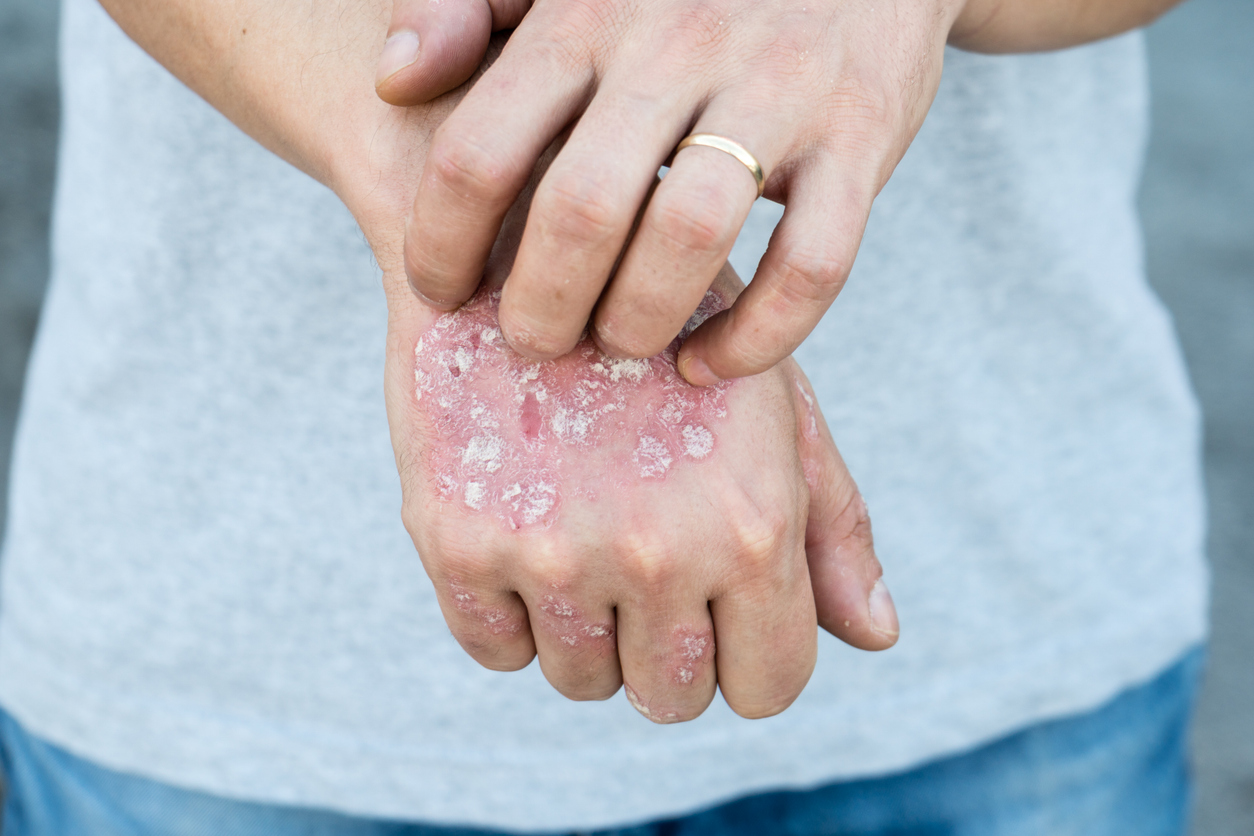Plaque psoriasis is a chronic skin condition that affects millions globally, causing discomfort and impacting quality of life. This article explores the key signs of plaque psoriasis, steps to take if you suspect you have it, and effective strategies for managing the condition. By gaining a deeper understanding of plaque psoriasis, you can take meaningful steps toward managing its symptoms and improving your well-being.

Understanding Plaque Psoriasis
Plaque psoriasis is an autoimmune disorder where the immune system mistakenly targets healthy skin cells. This action causes a rapid buildup of cells on the skin’s surface, leading to thick, scaly patches known as plaques. These plaques commonly develop on areas such as the elbows, knees, scalp, and lower back but can appear anywhere. According to the National Psoriasis Foundation, around 80-90% of individuals with psoriasis have this plaque-type variant, making it the most prevalent form of the disease.
Identifying Plaque Psoriasis Symptoms
Recognizing plaque psoriasis symptoms early can be crucial for effective management. Here are ten common symptoms that may indicate plaque psoriasis:
- Red, inflamed patches covered by silvery-white scales
- Dry, cracked skin that may bleed
- Itching, burning, or soreness around affected areas
- Thickened or pitted nails
- Swollen and stiff joints (in severe cases)
- Rapid turnover of skin cells causing noticeable flaking
- Localized pain and skin sensitivity
- Scalp scaling that extends beyond the hairline
- Raised, rough-feeling plaques
- Symptoms that worsen in cold or dry climates
If you are experiencing any of these symptoms, a consultation with a healthcare provider can provide a confirmed diagnosis and guidance for managing the condition. For further insight, check the WebMD Plaque Psoriasis Facts page.
What to Do If You Suspect Plaque Psoriasis
If you believe you may have plaque psoriasis, taking prompt action can be beneficial. Here are steps to consider:
- Schedule a Dermatologist Appointment: A dermatologist can perform a skin biopsy or other tests to confirm if the symptoms are psoriasis-related.
- Document Symptoms: Keeping a record of flare-ups, their intensity, and potential triggers can help you and your healthcare provider better understand the condition.
- Avoid Common Triggers: Known triggers for flare-ups include stress, skin injuries, certain medications, and environmental factors.
- Educate Yourself: Knowledge is a powerful tool for managing plaque psoriasis. Reliable resources such as DermNet NZ’s page on Chronic Plaque Psoriasis provide valuable information.
Taking these early steps can help prevent symptom escalation and reduce the likelihood of complications.
Common Triggers of Plaque Psoriasis
Understanding what triggers plaque psoriasis is essential for reducing flare-ups. Here are some common triggers to be aware of:
- Stress: High stress levels can weaken the immune system, leading to inflammation and triggering psoriasis symptoms.
- Skin Injuries: Even minor skin injuries like cuts, burns, or sunburns can trigger new plaques in affected areas (known as the Koebner phenomenon).
- Cold, Dry Weather: Harsh weather conditions can dehydrate the skin and exacerbate symptoms.
- Certain Medications: Medications such as lithium, beta-blockers, and antimalarial drugs may aggravate psoriasis.
For a deeper understanding of triggers, the Mayo Clinic’s Psoriasis page is an excellent resource.
Effective Treatment Options for Plaque Psoriasis
Managing plaque psoriasis effectively often requires a combination of treatments and lifestyle modifications. Here are some options commonly recommended:
- Topical Treatments: Over-the-counter and prescription creams or ointments help reduce redness, itching, and flaking.
- Phototherapy: Exposure to controlled levels of natural or artificial UV light can benefit individuals with moderate to severe psoriasis.
- Systemic Medications: Oral or injectable medications such as methotrexate, cyclosporine, and biologics can reduce inflammation and immune response in severe cases.
- Lifestyle Adjustments: Reducing stress, avoiding triggers, and maintaining a healthy lifestyle can support long-term management.
For more information, see the Cleveland Clinic’s Plaque Psoriasis Guide.
Living with Plaque Psoriasis: Lifestyle Tips
In addition to medical treatments, lifestyle choices can significantly impact the management of plaque psoriasis symptoms. Here are practical lifestyle changes to support your health and well-being:
- Hydrate: Drinking sufficient water daily helps keep skin hydrated and supports overall health.
- Follow an Anti-Inflammatory Diet: Foods rich in anti-inflammatory properties, such as fruits, vegetables, whole grains, and omega-3 fatty acids, may help reduce inflammation.
- Manage Stress: Practicing yoga, meditation, or light physical exercise can reduce stress, which is a common trigger for psoriasis flare-ups.
- Regularly Moisturize: Applying moisturizer after bathing can help combat dryness and scaling.
Consistently following these lifestyle tips can help minimize flare-ups and improve quality of life.
Long-Term Outlook for Individuals with Plaque Psoriasis
Although there is no cure for plaque psoriasis, many individuals manage the condition well and lead full, healthy lives. Advances in medical treatments, particularly biologics and immunosuppressants, offer effective symptom control and have greatly improved the outlook for many with this condition. Working closely with a healthcare provider and utilizing resources like the National Psoriasis Foundation can help those with plaque psoriasis achieve a better quality of life.




